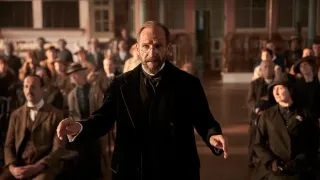July 29, 2021
In 'Amour & After,' Melissa Errico Continues Her Love Affair With Composer Michel Legrand
John Amodeo READ TIME: 13 MIN.
"I learned from Legrand that I can freely jump styles, even within the song," imparts Broadway, concert, cabaret, and recording artist Melissa Errico. She is referring to one of her long-time collaborators, the prolific and marvelously eclectic film and stage composer Michel Legrand, who passed away a little over two years ago at the age of 86 after a nearly seven-decade composing career.
Errico, who appeared in Legrand's Broadway musical debut, "Amour," for which she was nominated for a Leading Actress Tony Award, explores Legrand's rich oeuvre of Oscar- and Grammy-winning film scores in her upcoming show, "Amour & After: Melissa Errico Sings the Music of Michel Legrand" at the Crown & Anchor in Provincetown, Massachusetts (August 4-5), and at the Cotuit Center for the Arts in Cotuit, Massachusetts (August 6).
Probably known best for his Oscar-winning song "The Windmills of Your Mind," which he wrote for the 1968 film "The Thomas Crown Affair," Legrand's oeuvre stretches much farther, from the chansons of his native France to the Brazilian beat inspired by his good friend Antônio Carlos Jobim and the pure romantic confections he wrote for his Oscar-winning film scores such as the seductive "Summer of '42" and the epically dramatic "Yentl," many written with the lyricist team of Alan and Marilyn Bergman. Songs like "What Are You Doing the Rest of Your Life?" and "How Do You Keep the Music Playing?", both with lyrics by the Bergmans, have long outlived the films for which they were written and are recording, concert, and cabaret staples.
This isn't Errico's first tribute to Legrand, having first performed the cabaret show "Legrand Affair" with musical director John Oddo, who was Rosemary Clooney's longtime musical director. Oddo took liberties with the arrangements, claiming that Legrand who performed his own music in styles that diverged broadly from the original, would approve. "He had [the] first crack at arranging music for me," Errico said of Oddo. "I was late to this, tailoring music to my sensibility, not even 20 years ago." While "Legrand Affair" focused entirely on Legrand's collaborations with the Bergmans, "Amour & After" goes beyond that, exploring the composer's larger opus.
Errico follows in a long line of Broadway leading ladies who have also had careers as recording, concert, and cabaret performers. Like many of them, she was too busy for concerts and recordings in her early career, having been cast in a featured role in her first Broadway musical, the short-lived "Anna Karenina," right out of college, followed by leading roles in five more Broadway shows in rapid succession over the next two decades, including her star turn as Eliza Doolittle in the 1993 revival of "My Fair Lady" opposite Richard Chamberlain.
She would go on to play ingenues well into her forties. But as the demands of being a mother of three daughters made long runs in Broadway shows more of a challenge, Errico turned to recording and concerts, with a special focus on two composers with whom she has strong connections: Stephen Sondheim, and of course, Legrand. Stephen Holden of the New York Times declared Errico has the "power to carry a sumptuous Broadway ballad to the moon and back." And Steve Murray of Cabaret Scenes proclaimed, "Errico had won our hearts. She is and will continue to be the premiere interpreter of the musical legacy of Michel Legrand."
EDGE caught up with Errico right on the heels of her recent appearance at the Holmdel Theatre Company's "Broadway Outside the Barn" series, where Errico performed her show, "Sondheim by the Shore." Remarkably alert for having only gotten to bed at 4 a.m. the night before, Errico shared her thoughts about Legrand, Broadway, and sex.
EDGE: With all your theater training and experience, was it at all a challenge to adjust to the intimacy and vulnerability of cabaret, with no fourth wall between you and the audience?
Melissa Errico: I began only a few years ago finding ways of making cabaret theatrical, giving each show an arc and shape and substance. I try to create what I call jokingly "caber-essays," shows that have real substance as well as great songs. I love working with my frequent collaborator and 'specialty' lyricist and co-writer Adam Gopnik of The New Yorker. He finds ways of putting ideas in mind that seem to belong there; I vibrate to his imagination. He's always witty and, in a professorial sort of way, sometimes wicked. (See for instance his "Baby, It's Woke Outside," the 2020 update he wrote of the great Frank Loesser song for my Christmas show at the Bay Street theater.) As for the vulnerability of cabaret, I felt it was much like doing a close-up in movies. As they say, the camera can tell if you are telling the truth. So, with cabaret. I'm pretty sure that if you zoom into my eyes, you will find I absolutely love my music and I'm willing to let it take me, and you, anywhere.
EDGE: Your art history degree from Yale made you a perfect choice to play Dot/Marie in the Kennedy Center production of "Sunday in the Park with George." Were you able to draw from your appreciation of art during your performances in that show?
Melissa Errico: Well, you know, it's an astonishing thing. I insisted – when I did "Sunday" with Raul Esparza, my dream stage husband – that I play the opening scene nude in the bath since that seemed so right for the period. I blush now at my own naiveté: you shouldn't just tell Sondheim how to stage his shows! But just the other day I was looking at pictures, as I love to do, and I realized that the back of one of the models in Seurat's "Poseuses" was exactly like the pose I had adopted on stage. I realized that my own interpretation of Dot in a bathtub, nude, seen from behind with a towel draped around her rear, had been in Seurat's mind too! (I actually Instagrammed the resemblance, side by side.)
So, it must have been haunting me unconsciously. But I love imagery and scene painting; one of the things I love about working with first-rate directors is that they make great stage images, as John Doyle did in "Passion."
EDGE: You have a remarkable vocal instrument that seems every bit intact now as it did when I first saw you in "My Fair Lady" on Broadway. How do you take care of your instrument to maintain your vocal health?
Melissa Errico: Wow, well, cross my fingers and heart and all the rest. Like every singer, I've had my moments of doubt and pain, but without ego, I do think that I like my voice now more than I ever have; I like my own sultry mid-voice as it has developed and as I sing less of the clarion-call soprano that I started out with. I still love singing that Eliza and Maria music, but there are new mature sounds to find. How do I maintain it? Vast quantities – oceans – of water, wonderful vocal coaching from Joan Lader and Susan Eichhorn Young and Phil Hall, and constant creative use. Singing should sustain, not stretch your voice. I wish I could tell you that I rest plenty, too, because that is good for your voice. Alas, I never seem to rest. I was born insomniac and have been dancing at six weddings at once since I was one. The oldest photograph I have of myself at one shows my eyes darting around the playground, looking for excitement.
EDGE: Your first collaboration with Legrand was in the production of "Amour." Did you both develop an immediate connection, or did that develop over a longer period?
Melissa Errico: My first personal direct contact with Michel was during a rehearsal for "Amour," yes. But he had been part of my life since I was a girl since it was the music my father, a severe classical pianist – and an outstanding orthopedic surgeon, who had always played for pleasure, and honestly, to seduce my mother. So I had associated [Legrand's] music with sensuality all my life. Meeting Michel was like meeting any great artist: he was both unlike his art – a mischievous high-energy older Frenchman – and exactly like his art, a flowing fountain of melody and charm.
EDGE: What do you feel is extraordinary and unique about his music that compels you to perform his songs?
Melissa Errico: It's always hard to define what makes music compelling, but with Legrand, it was the mix of beautiful melody and some haunted, mesmerizing quality that you hear in things like "Windmills of Your Mind." There's something as purely French about it as a Manet still life or a Matisse drawing, that mix of sensuality and angularity. Love. Also, the sense he supplies – which was completely real in life, by the way – that the music is just pouring out, is a sensual flow, not made by a series of craftsman's decisions. There was so much music in Michel that sometimes you would show him some beautiful thing he had written, and he would genuinely, honestly, have no memory of it at all. He made music the way other people breathe.
EDGE: Shortly after his death in January 2019, you were asked to write his eulogy for the New York Times, then to perform tribute concerts for him throughout that same year. Being so close to him, was this difficult for you or cathartic?
Melissa Errico: It was pure pleasure. I had not seen as much of Michel in the final years as I once had – having three daughters under 10 creates all kinds of surprising, invisible barriers between you and your previous lives! And so being asked to write about him gave me the chance to recall him at his height and to assemble my own memories into a continuous thread. And of course, when you write about someone you loved who has gone, you hope that the breath they breathed into you, you can breathe back into their memory, and help their spirit live a little longer. I loved thinking of Michel. Flying his plane and playing his keyboard and calling out "Meleesa! Ma-lees-ah!" when he was impatient to play me something. Those details are all of life.
EDGE: After his death, when searching through your Legrand memorabilia for the many tributes for which you were preparing, you came across the material of his that was previously unrecorded and parlor recordings of you singing some of this material that was previously unreleased. What did you think you would do with that material when you found it? Will you be singing any of that material in your Cotuit concert?
Melissa Errico: Most of that material was of songs I eventually recorded, and some of which, yes, I sing and will sing again. What was magical about it was remembering the improvisational ease with which we dived and swooped through music together.
EDGE: The song "I Haven't Thought of This in Quite a While," was the last collaboration between Legrand and his longtime collaborators, the great lyricists Alan and Marilyn Bergman. The Bergmans entrusted this song to you, to be the first to perform and record it. How did you go about doing justice to such an honor?
Melissa Errico: It was an astonishing honor, yes. I called Alan and Marilyn to confirm that "Hurry Home" had been their last song together, and they said no, not quite. "I Haven't Thought of This" is a retrospective song with a woman recalling her long marriage, beautifully summing up complex memories in three simple-seeming words: "We had fun." I've been married now for 22 years (!) to Patrick McEnroe, with all the magic that long marriages make, so those were emotions that I could enter and inhabit.
EDGE: Tell me more about "Hurry Home," the last great Legrand/Bergman collaboration for the film. This is almost like a one-act play. How do you place yourself into a story like this?
Melissa Errico: You find the correlative in your own life – in this case, family longings – and try to sit inside it. When I was recording the Alec Wilder song "Blackberry Winter" last year during the pandemic, I found that I had whispered to myself, just before I began: "Make it personal." I hadn't intended to do that, but my producer insisted that I keep it on the record. It's the key to everything I do. Making it personal.
EDGE: On your recording, "Legrand Affair," you are backed by a 100-piece orchestra. At the Cotuit concert, and I also presume at the Provincetown concert that same week, you will be performing with only piano accompaniment, though you will be aided by the great Tedd Firth at the piano. Do you have to make any stylistic adjustments to your presentation performing with only voice and piano?
Melissa Errico: Tedd is, yes, an amazing orchestral pianist, who can dance along a knife's edge of jazz or open the piano up to oceanic feeling. I'll never have a finer musical high than the moment I walked into the studio, in Belgium, as it happens, and heard that hundred-plus piece orchestra playing Michel's arrangements. There's a video of me actually crying as I did! But no, I don't miss it or have to adjust to its absence. Tedd is my symphony.
EDGE: In "Amour & After," is it all Legrand all the time, or do you digress at all?
Melissa Errico: I do digress from Legrand in the show. I take a break with some Sondheim, and Cole Porter. I go to Jobim, which people don't expect. Legrand's music is so romantic. It's so lovey-dovey. It's like sex: you can't have it all day. It's the opposite of doing a Sondheim show: You can't talk all day, you have to have sex, too.
EDGE: You've been exploring other sides of your creativity in recent years developing your writing, having now written at least a half dozen pieces for the New York Times, including pieces on both Legrand and Sondheim. How else might your writing develop? Is there a book or a play in the future?
Melissa Errico: I love writing. I've always loved writing and filled journals and diaries with notes and kept blogs and all the rest. The great director Howard Davies always encouraged me to write plays, not just appear in them. The chance to write for the Times was a great gift from the editor Scott Heller and has enriched my life and brought new discipline to my mind and heart. Yes, I'm working on a book. I don't want to jinx it by saying too much about it too soon, but it's the story of a "terminal ingenue" who has had her dreams fulfilled and her heartbroken by Broadway and musical theater. She's a chanteuse by night in smoky nightclubs and a Bronxville mom by day driving two ballerinas and tennis player to their dates. I wonder who she's based on? Contradiction and fruitful tension is what good writing demands, Adam Gopnik tells me, and God knows if that's true, I've had enough of it in one life to fill many books.
Melissa Errico performs "Amour & After: Melissa Errico Sings the Music of Michel Legrand" on Wednesday, August 4, and Thursday, August 5, at 6 p.m. at the Crown & Anchor, 247 Commercial Street, Provincetown, Massachusetts, 02657. Cover: $44-$59. For tickets, visit: https://onlyatthecrown.com/eventgroup/352
On Friday, August 6, at 7:30 p.m. at Cotuit Center for the Arts, 4404 Falmouth Road, Cotuit, Massachusetts. Tickets: $55. For tickets, visit: https://artsonthecape.org/explore/amour-after-melissa-errico-sings-the-music-of-michel-legrand
Follow Melissa Errico on Twitter (@melissa_errico) and Instagram (@melissa_errico_fairymom)
Watch Melissa Errico sing "Little Boy Blue" from "Legrand Affair" below:






